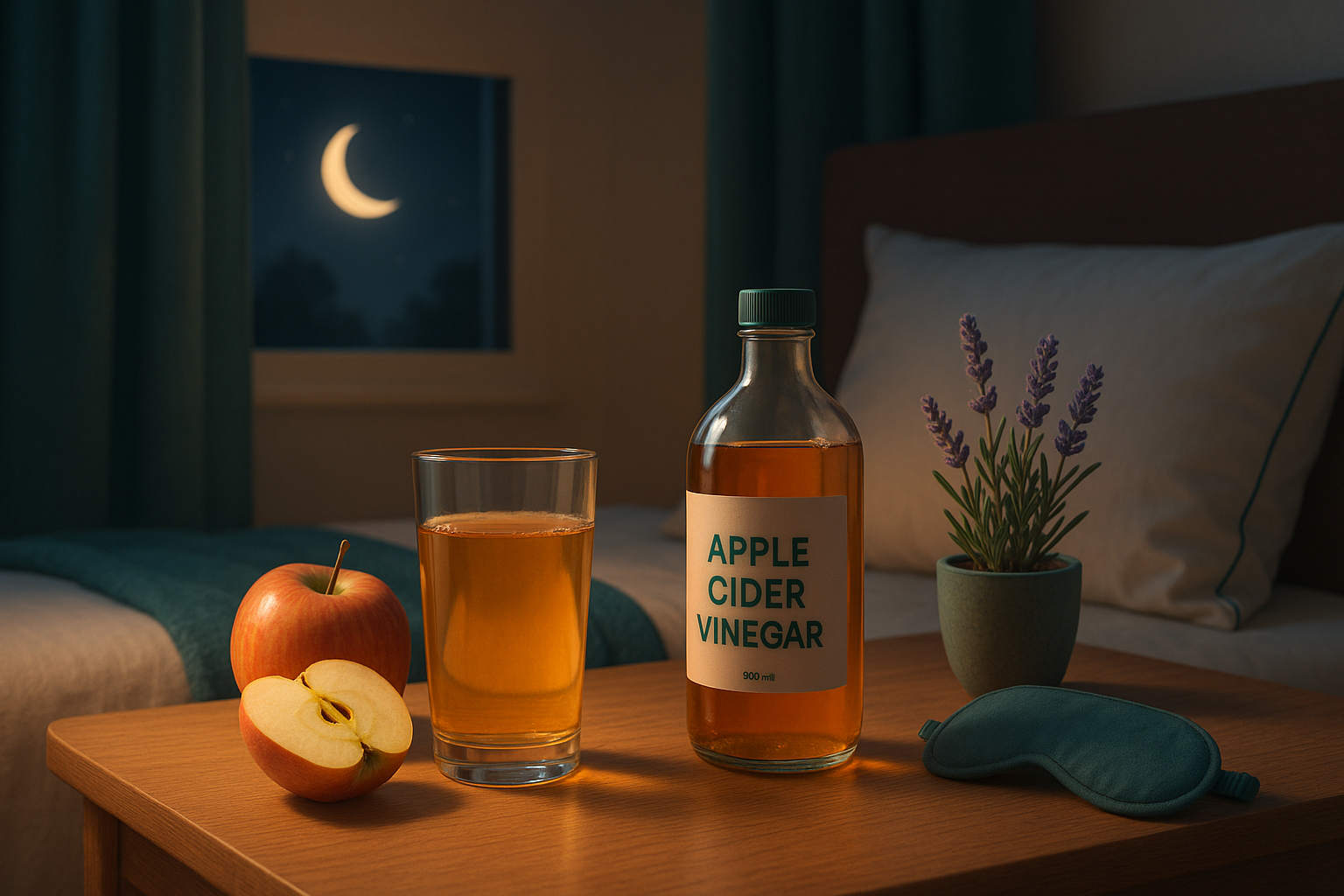Could a Nightly Shot of Apple Cider Vinegar Transform Your Health?
TikTok trends call it a miracle. Health blogs swear by it. But what really happens when you drink apple cider vinegar (ACV) before bed?
From balancing blood sugar to aiding digestion and sleep, ACV has become a popular addition to bedtime routines. But is it just hype—or does science back the claims?
In this blog, we’ll dive into everything you need to know: benefits, risks, how to use it safely, and what to avoid.
Whether you’re looking to improve gut health or simply curious about this ancient remedy, we’ve got you covered—with facts, not fluff.
What Is Apple Cider Vinegar?
Apple cider vinegar (ACV) is a type of vinegar made by fermenting apple juice with yeast and bacteria. This process turns sugars into acetic acid—the main active compound responsible for its tangy taste and potential health benefits.
Key Components of ACV
| Compound | Description |
| Acetic acid | Supports blood sugar control, antimicrobial |
| Probiotics (Mother) | May support gut health |
| Antioxidants | Helps reduce oxidative stress |
| Trace minerals | Includes potassium, magnesium |
Most store-bought ACV is unfiltered and raw, containing a cloudy substance called “the mother,” rich in beneficial enzymes and bacteria.
Why Do People Drink ACV Before Bed Instead of In the Morning?
Nighttime consumption is often believed to:
- Reduce late-night sugar cravings
- Stabilize blood sugar overnight
- Improve digestion while you sleep
- Support fat metabolism and detox (claims not fully proven)
7 Science-Backed Benefits of Apple Cider Vinegar Before Bed

Blood Sugar Control
Drinking diluted ACV before bed may help reduce fasting blood glucose levels in the morning.
A small 2007 study published in Diabetes Care found that patients with type 2 diabetes who consumed 2 tablespoons of ACV before bed experienced lower morning blood sugar levels.
How it works: Acetic acid slows the breakdown of carbohydrates and enhances insulin sensitivity. [Source]
Weight Management & Reduced Cravings
Some studies suggest that ACV may increase satiety, reducing calorie intake the next day.
Taking it before bed could also suppress nighttime hunger pangs, especially when mixed with warm water.
| Study | Finding |
|---|---|
| Journal of Functional Foods (2018) | Participants consuming vinegar had reduced appetite and BMI after 12 weeks. |
| Healthline | Anecdotal support for ACV reducing nighttime snacking. |
Try this: Mix 1 tbsp ACV with 1 cup warm water before bed to help curb sugar cravings.
Gut Health Support
Apple cider vinegar may act as a prebiotic, feeding beneficial gut bacteria and supporting healthy digestion.
Its acidic nature can also help stimulate stomach acid production, improving nutrient absorption and reducing bloating.
The “mother” in raw ACV contains probiotics, enzymes, and amino acids linked to better gut balance.
May Support Heart Health
Some animal and limited human studies suggest that regular intake of ACV may help lower cholesterol and triglyceride levels, contributing to overall heart health.
A 2012 study published in Life Science Journal found that participants who consumed apple cider vinegar experienced significant reductions in LDL (“bad”) cholesterol and an increase in HDL (“good”) cholesterol.
While more human studies are needed, ACV’s antioxidant and anti-inflammatory effects show potential in reducing heart disease risk over time.
Antimicrobial Properties
ACV has been used for centuries as a natural disinfectant.
The acetic acid in it can kill certain strains of harmful bacteria and pathogens, including E. coli and Staphylococcus aureus in lab conditions.
Some people gargle diluted ACV to relieve sore throat symptoms, although this isn’t medically proven.
May Help With Mild Acid Reflux or Indigestion
It sounds counterintuitive, but some people with low stomach acid find that a small amount of ACV before bed reduces symptoms of bloating or indigestion.
Important: If you suffer from frequent acid reflux or GERD, ACV might worsen symptoms instead of helping. Always consult your doctor. [Source]
Possibly Enhances Sleep Quality
While no clinical studies prove that ACV improves sleep, many individuals claim it helps them fall asleep faster, especially when mixed with honey or warm water.
ACV may stabilize blood sugar throughout the night, a factor that can influence sleep quality, particularly for those who wake due to low glucose levels. [Source]
Summary of Benefits vs. Scientific Support
| Benefit | Scientific Evidence Level | Recommended Dosage |
|---|---|---|
| Blood sugar control | ✔️ Small human studies | 1–2 tbsp diluted |
| Appetite/weight support | ✔️ Moderate (mixed results) | 1 tbsp before meals |
| Gut health | ⚠️ Anecdotal, emerging research | 1 tbsp in warm water |
| Heart health | ⚠️ Limited human studies | 1 tbsp daily |
| Antimicrobial properties | ✔️ In vitro studies only | Not for internal use |
| Reflux aid (low acid only) | ⚠️ Not for all reflux types | 1 tsp before meals |
| Sleep support | ⚠️ Anecdotal | 1 tbsp + honey at night |
Risks & Side Effects of Drinking ACV Before Bed
Before you add ACV to your nightly routine, be aware of the potential downsides—especially when consumed undiluted or in excess.
Tooth Enamel Erosion
ACV is highly acidic and can wear down your tooth enamel over time.
Drinking it before bed, when saliva production slows, can worsen this effect.
Pro Tip: Always dilute ACV in water and drink it with a straw. Never brush your teeth immediately after drinking.
Digestive Discomfort & Nausea
Some people experience stomach upset, especially if ACV is taken on an empty stomach or without proper dilution.
Start with smaller doses (1 tsp) and increase gradually if tolerated.
Throat Irritation & Esophageal Burns
Drinking undiluted ACV can lead to burning sensations in the throat or esophagus.
Never take ACV as a shot. Always dilute in at least 8 oz of water.
Drug Interactions & Nutrient Depletion
ACV may interact with:
- Diabetes medications
- Diuretics
- Heart medications
It can also reduce potassium levels when taken in large doses.
If you’re on medication or have a chronic condition, speak with your pharmacist or healthcare provider first.
How to Safely Drink Apple Cider Vinegar Before Bed
Adding ACV to your bedtime routine doesn’t mean downing a straight shot and heading to sleep. In fact, doing so may cause more harm than good. Here’s how to do it the right way:
Best Practices for Bedtime ACV Consumption
Always Dilute It: Mix 1 to 2 teaspoons of raw, unfiltered ACV in a full glass (8 oz) of water. Stir well and drink slowly.
Timing Matters: Take it 30–60 minutes before bed to allow digestion and minimize reflux risk.
Use a Straw: To protect tooth enamel, sip through a straw and rinse your mouth afterward.
Avoid Brushing Immediately: Wait at least 30 minutes before brushing teeth to avoid acid-enamel damage.
Start Small: Begin with ½ to 1 teaspoon per day to see how your body responds.
People Also Ask
Is it good to drink apple cider vinegar before bed for weight loss?
Yes, drinking diluted ACV before bed may help reduce late-night cravings and improve satiety. This can support weight management when combined with a healthy lifestyle. However, don’t expect dramatic weight loss from vinegar alone.
Can apple cider vinegar help with acid reflux?
For some people with low stomach acid, diluted ACV may ease mild indigestion. But for those with GERD or frequent acid reflux, ACV may actually worsen symptoms. Always test cautiously and consult a healthcare provider.
Will drinking ACV at night damage my teeth?
Yes—if undiluted. ACV is highly acidic and can erode tooth enamel, especially if taken right before bed. Always dilute in water, use a straw, and rinse your mouth afterward.
How much apple cider vinegar should I drink before bed?
Start with 1 teaspoon diluted in water. If tolerated, gradually increase to 1 tablespoon, but not more than that per day unless directed by a doctor.
Does apple cider vinegar help you sleep better?
There’s no scientific proof that ACV directly improves sleep, but some believe it helps by stabilizing blood sugar, reducing nighttime hunger, and soothing digestion. Anecdotal evidence supports this, but more research is needed.
Final Thoughts – Should You Try Apple Cider Vinegar Before Bed?
Apple cider vinegar isn’t a miracle cure, but it may offer real benefits when used wisely.
From blood sugar control to curbing cravings, and from gut support to possible heart benefits, ACV can be a helpful tool—especially when taken at night with care.
But remember:
- Always dilute it.
- Start slow.
- Listen to your body.
If you’re considering trying it for the first time, consult your doctor—especially if you’re on medication.
And for a more convenient alternative, check out our Apple Cider Vinegar capsules—no taste, no tooth risk, just the benefits.
